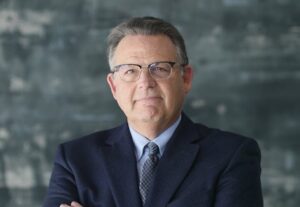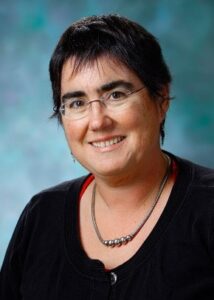 The service of MARIO MOLINA, M.D., to Johns Hopkins Medicine is unparalleled as a university trustee, chair of the Osler Advisory Board, and generous supporter of the Molina Scholars through the physician-scientist pathway in the Osler Medical Residency Program. Dr. Molina has funded three professorships in the School of Medicine – the C. David Molina Professorship in the Welch Center, the Myron L. Weisfeldt Professor of Medicine in the Osler Residency Program, and the J. Mario Molina Endowed Professorship in the History of Medicine. He has also endowed two scholarships in the School of Medicine (the Loren G. Lipson, M.D., Endowed Scholarship Fund, and the Molina Family Endowed Scholarship).
The service of MARIO MOLINA, M.D., to Johns Hopkins Medicine is unparalleled as a university trustee, chair of the Osler Advisory Board, and generous supporter of the Molina Scholars through the physician-scientist pathway in the Osler Medical Residency Program. Dr. Molina has funded three professorships in the School of Medicine – the C. David Molina Professorship in the Welch Center, the Myron L. Weisfeldt Professor of Medicine in the Osler Residency Program, and the J. Mario Molina Endowed Professorship in the History of Medicine. He has also endowed two scholarships in the School of Medicine (the Loren G. Lipson, M.D., Endowed Scholarship Fund, and the Molina Family Endowed Scholarship).
Dr. Molina earned a bachelor’s degree from California State University, Long Beach where he was elected to membership in Phi Beta Kappa. He earned a medical degree from the University of Southern California where he was elected to membership in Alpha Omega Alpha. Dr. Molina performed his residency in internal medicine at Johns Hopkins Hospital, then a fellowship in endocrinology at the University of California, San Diego. He was a faculty member at USC before joining Molina Healthcare. He received a certificate in management from the Anderson School of Business at UCLA.
In 2005, Dr. Molina was named as one of the 25 Most Influential Hispanics in America by Time Magazine and in 2013, he was awarded an honorary doctorate by Claremont Graduate University.
Dr. Molina is the former chairman and chief executive officer of Molina Healthcare, a FORTUNE 500 company founded by his physician father in 1980 to provide health care to low income individuals receiving benefits through government programs, such as Medicaid and Medicare.
Through his generosity, Dr. Molina has secured his legacy and commitment to Johns Hopkins Medicine. The impact will resonate for decades to come.
Held by Mary E. Fissell
 MARY E. FISSELL, Ph.D., is a professor of history of medicine at the Johns Hopkins University School of Medicine, with appointments in the History of Science and Technology and History departments. She’s a historian of medicine interested in how ordinary people in the past lived in their bodies. Everyone is born, gets sick, and dies. Those moments are biological, but they are experienced in ways that are specific to time and place. Her focus is on pre-modern medicine, the centuries when most people assume that medicine had little to offer. On the contrary. Healers of all kinds offered sufferers a range of care that we have largely forgotten about. What happens at the bedside is so much more than technology, and makes for powerful histories.
MARY E. FISSELL, Ph.D., is a professor of history of medicine at the Johns Hopkins University School of Medicine, with appointments in the History of Science and Technology and History departments. She’s a historian of medicine interested in how ordinary people in the past lived in their bodies. Everyone is born, gets sick, and dies. Those moments are biological, but they are experienced in ways that are specific to time and place. Her focus is on pre-modern medicine, the centuries when most people assume that medicine had little to offer. On the contrary. Healers of all kinds offered sufferers a range of care that we have largely forgotten about. What happens at the bedside is so much more than technology, and makes for powerful histories.
Dr. Fissell is currently writing a trade book on the long history of abortion, from antiquity to antibiotics, and has just finished a manuscript on the history of sex education before the twentieth century, when it began to be taught in schools. She’s also the author of Vernacular Bodies (Oxford, 2004), a book about how ordinary people understood the processes of reproduction in early modern England in relation to sweeping social changes, and numerous scholarly articles.
Dr. Fissell received her B.A. and Ph.D. from the University of Pennsylvania, where she wrote her dissertation in the History and Sociology department under the direction of Charles Rosenberg. She joined the Johns Hopkins faculty in 1992, and has served as the first director of the department’s online program and as editor of the Bulletin of the History of Medicine. Prior to joining Johns Hopkins, Dr. Fissell was a lecturer and research associate at the Wellcome Unit for the History of Medicine at the University of Manchester.
She lives in the city, where she raised her son, now a fashion designer. In her spare time she’s an artist and metalsmith and enjoys spending time taming the jungle she refers to as her garden.
 The service of MARIO MOLINA, M.D., to Johns Hopkins Medicine is unparalleled as a university trustee, chair of the Osler Advisory Board, and generous supporter of the Molina Scholars through the physician-scientist pathway in the Osler Medical Residency Program. Dr. Molina has funded three professorships in the School of Medicine – the C. David Molina Professorship in the Welch Center, the Myron L. Weisfeldt Professor of Medicine in the Osler Residency Program, and the J. Mario Molina Endowed Professorship in the History of Medicine. He has also endowed two scholarships in the School of Medicine (the Loren G. Lipson, M.D., Endowed Scholarship Fund, and the Molina Family Endowed Scholarship).
The service of MARIO MOLINA, M.D., to Johns Hopkins Medicine is unparalleled as a university trustee, chair of the Osler Advisory Board, and generous supporter of the Molina Scholars through the physician-scientist pathway in the Osler Medical Residency Program. Dr. Molina has funded three professorships in the School of Medicine – the C. David Molina Professorship in the Welch Center, the Myron L. Weisfeldt Professor of Medicine in the Osler Residency Program, and the J. Mario Molina Endowed Professorship in the History of Medicine. He has also endowed two scholarships in the School of Medicine (the Loren G. Lipson, M.D., Endowed Scholarship Fund, and the Molina Family Endowed Scholarship).